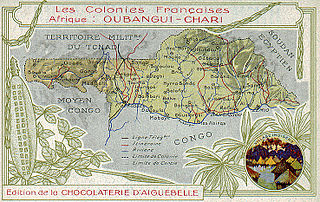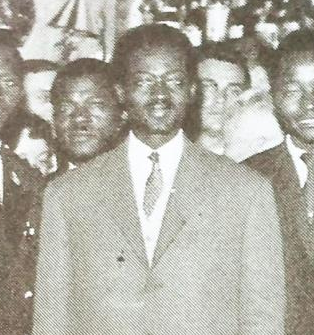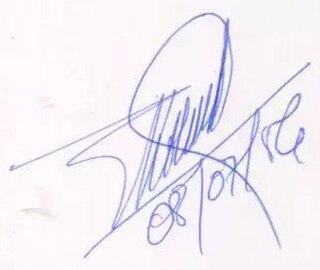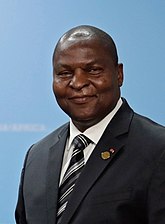
The Central African Republic (CAR), formerly known as Ubangi-Shari, is a landlocked country in Central Africa. It is bordered by Chad to the north, Sudan to the northeast, South Sudan to the east, the Democratic Republic of the Congo to the south, the Republic of the Congo to the southwest, and Cameroon to the west. Bangui is the country's capital and largest city, at the border of the Democratic Republic of the Congo. The Central African Republic covers a land area of about 620,000 square kilometres (240,000 sq mi). As of 2021, it had an estimated population of around 5.5 million. As of 2024, the Central African Republic is the scene of a civil war, which has been ongoing since 2012.

The history of the Central African Republic is roughly composed of four distinct periods. The earliest period of settlement began around 10,000 years ago when nomadic people first began to settle, farm and fish in the region. The next period began around 10,000 years prior.

Jean-Bédel Bokassa, also known as Bokassa I, was a Central African political and military leader who served as the second president of the Central African Republic (CAR) and as the emperor of its successor state, the Central African Empire (CAE), from the Saint-Sylvestre coup d'état on 1 January 1966 until his overthrow in a subsequent coup in 1979.

François Bozizé Yangouvonda is a Central African politician who was President of the Central African Republic from 2003 to 2013. He was also the only Central African president born in modern day Gabon.

Ange-Félix Patassé was a Central African politician who was president of the Central African Republic from 1993 until 2003, when he was deposed by the rebel leader François Bozizé in the 2003 coup d'état. Patassé was the first president in the CAR's history to be chosen in what was generally regarded as a fairly democratic election (1993) in that it was brought about by donor pressure on President André Kolingba and assisted by the United Nations Electoral Assistance Unit.

David Dacko was a Central African politician who served as the first President of the Central African Republic from 14 August 1960 to 1 January 1966 and as the third President of the Central African Republic from 21 September 1979 to 1 September 1981. He also served as Prime Minister of the Central African Republic from 1 May 1959 to 14 August 1960. After his second removal from power in a coup d'état led by General André Kolingba, he pursued an active career as an opposition politician and presidential candidate with many loyal supporters; Dacko was an important political figure in the country for over 50 years.

Abel Nguéndé Goumba was a Central African politician. During the late 1950s, he headed the government in the period prior to independence from France, and following independence he was an unsuccessful candidate for President of the Central African Republic four times. Goumba, who was President of the Patriotic Front for Progress (FPP) political party, served under President François Bozizé as Prime Minister from March 2003 to December 2003 and then as Vice President of the Central African Republic from December 2003 to March 2005. Subsequently, he was appointed to the official post of Ombudsman.

Célestin Leroy Gaombalet was a Central African politician who was Prime Minister of the Central African Republic from 2003 to 2005. He was President of the National Assembly of the Central African Republic from 2005 to 2013.

André-Dieudonné Kolingba was a Central African politician, who was the fourth President of the Central African Republic (CAR), from 1 September 1981 until 1 October 1993. He took power from President David Dacko in a bloodless coup d'état in 1981 and lost power to Ange-Félix Patassé in a democratic election held in 1993. Kolingba retained the strong support of France until the end of the Cold War in 1992, after which both internal and external pressure forced him to hold presidential elections which he lost.

Barthélemy Boganda was a Central African politician and independence activist. Boganda was active prior to his country's independence, during the period when the area, part of French Equatorial Africa, was administered by France under the name of Oubangui-Chari. He served as the first Premier of the Central African Republic as an autonomous territory.

General elections were held in the Central African Republic on March 13, 2005 to elect the President and National Assembly. A second round was held for both elections on May 8, marking the end of the transitional process that began with the seizure of power by François Bozizé in a March 2003 coup, overthrowing President Ange-Félix Patassé. A new constitution was approved in a referendum in December 2004 and took effect the same month.
Henri Maïdou is a Central African retired politician who served as Prime Minister of the Central African Empire from 14 July 1978 to 26 September 1979, and Vice President of the Central African Republic in the cabinet of David Dacko from 26 September 1979 to 22 August 1980.

The Movement for the Social Evolution of Black Africa was a political party in the Central African Republic. In its original form, it was a nationalist quasi-religious party that sought to affirm black humanity and advocated for the independence of Ubangi-Shari, then a French colonial territory.

The Saint-Sylvestre coup d'état was a coup d'état staged by Jean-Bédel Bokassa, commander-in-chief of the Central African Republic (CAR) army, and his officers against the government of President David Dacko on 31 December 1965 and 1 January 1966. Dacko, Bokassa's cousin, took over the country in 1960, and Bokassa, an officer in the French army, joined the CAR army in 1962. By 1965, the country was in turmoil—plagued by corruption and slow economic growth, while its borders were breached by rebels from neighboring countries. Dacko obtained financial aid from the People's Republic of China, but despite this support, the country's problems persisted. Bokassa made plans to take over the government; Dacko was made aware of this, and attempted to counter by forming the gendarmerie headed by Jean Izamo, who quickly became Dacko's closest adviser.
Lieutenant Colonel Alexandre Banza was a military officer and politician in the Central African Republic. Born in Carnot, Ubangi-Shari, Banza served with the French Army during the First Indochina War before joining the Central African Armed Forces. As commander of the Camp Kassaï military base in 1965, Banza helped Jean-Bédel Bokassa overthrow the government of President David Dacko. Bokassa rewarded Banza by appointing him as minister of state and minister of finance in the new government. Banza quickly established the new regime's reputation abroad and forged diplomatic relations with other countries. In 1967, Bokassa and his protégé had a major argument over the president's extravagances. In April 1968, Bokassa removed Banza as minister of finance. Recognizing Bokassa's attempts to undermine him, Banza made a number of remarks highly critical of the president's handling of the government. Bokassa responded by abolishing the minister of state position.
Jean-Henri Izamo was the head of the gendarmerie of the Central African Republic. He was killed following the Saint-Sylvestre coup d'état.

Nicolas Tiangaye is a Central African politician and lawyer who was Prime Minister of the Central African Republic from 17 January 2013 until his resignation on 10 January 2014. He was President of the National Transitional Council from 2003 to 2005.

Central African Republic–France relations are foreign relations between the Central African Republic (CAR) and France. Both nations are members of the Francophonie and the United Nations.

On 3 March 1982, opposition politician and leader of the MLPC party, Ange-Félix Patassé, returned from exile to the Central African Republic and staged an unsuccessful coup against General André Kolingba with the help of a few military officers, such as General François Bozizé, who accused Kolingba of treason and proclaimed the change of power in a radio announcement.




























